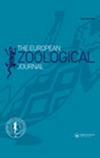Teaching zoology in the age of machines
引用次数: 3
Abstract
Zoology is disappearing from university curricula in first-world countries (whatever this means). New generations of biologists are illiterate in biodiversity, due to a mismatch between their initial expectations and what is proposed to them as “modern biology”. Almost invariably, young specimens of our species are attracted by living beings, especially animals. This tendency is reinforced by a myriad of TV programs about nature. Biology is synonymous with natural history, implying the exploration of secluded places, while looking for still unknown creatures. This is what pushed me towards biology; I made my thesis in a tuna trap, with a crew of rough fishermen, then spent long periods in places ranging from Papua New Guinea to California, and found many previously unknown species (and genera, and families), diving in shark-infested waters, exploring marine caves and following the seasons of the sea along vertical rocky cliffs from the surface to 30 m depth. Now, regular biology students spend their lives in the laboratory and see the world through the graphs of sophisticated machines. If they encounter animals, they do not know what they are by just looking at them, and the only chance they have to give them a name is to grind them, extract some sequences and match them with online databases. E. coli and C. elegans are more or less the same thing, together with Arabidopsis and D. melanogaster, a distant relative of the zebrafish! In some Italian universities, however, zoology is still taught, even if the hours dedicated to it are decreasing year after year. Francesca Strano, one of our students at the University of Salento, made her master thesis on a new species of pterobranch that we found some time ago in a marine cave. I had never seen a pterobranch before, and that was the first time a member of this class had been found in Italian waters, the second finding in the Mediterranean Sea. Francesca followed the life cycle of this beast, and studied the architecture of its nervous system, but the most important result was that she had stumbled into a species unknown to science, right in our backyard! Valerio Micaroni works at his master thesis in our new marine laboratory, the Mare Outpost at Tricase Porto. I gave him a very difficult task: produce an all-species inventory of the local fauna. He is in the water every day, and brings stuff to the lab, where he tries to give names to specimens, and to elucidate their life cycles, just as Francesca did with her pterobranch. Not easy at all, since most of the knowledge is frozen in outdated monographs, and knowledgeable living beings are rapidly disappearing. Francesca and Valerio are having great fun and spend all their time in studying their beasts; there is nothing else they want to do. The fishermen and the children of the village admire their passion and help them in their studies. The ocean literacy of the people of Tricase Porto is increasing and they come to the Outpost with their observations, asking questions. Culture evolved from our ability to observe animals, as witnessed by cave paintings, and we have an instinctive curiosity towards them. The education system is trying hard to eradicate this tendency from us, and the result is the lack of respect for nature that characterizes our relationship with the rest of the world. Zoology is the primeval form of culture, it’s the root of our history, and we are severing it from the rest of our cultural heritage. Francesca and Valerio are like Adam and Eve, in the forgotten Eden that we have in front of us (in which animals are still unnamed) but that we cannot see anymore. No wonder that children are their best assistants, as they are still uncorrupted by an education system that implacably separates our species from the rest of Nature, as if we could survive without her. If zoology is expelled from the capacity building system, as it is, and nobody teaches how to give names to animals anymore, we will rapidly lose our sense of responsibility for the ecosystems that sustain us. The modern trends in biology are leading to Italian Journal of Zoology, 2016, 283–284 Vol. 83, No. 3, http://dx.doi.org/10.1080/11250003.2016.1223610机器时代的动物学教学
动物学正在从第一世界国家的大学课程中消失(不管这意味着什么)。新一代的生物学家对生物多样性一无所知,这是由于他们最初的期望与向他们提出的“现代生物学”之间的不匹配。几乎无一例外,我们这个物种的年轻标本会被生物,尤其是动物所吸引。无数关于自然的电视节目强化了这种倾向。生物学是自然历史的同义词,意味着探索僻静的地方,同时寻找未知的生物。这就是促使我走向生物学的原因;我和一群粗野的渔民在一个金枪鱼陷阱里完成了我的论文,然后花了很长时间在从巴布亚新几内亚到加利福尼亚的地方,发现了许多以前不为人知的物种(以及属和科),在鲨鱼出没的水域潜水,探索海洋洞穴,沿着垂直的岩石悬崖从表面到30米深跟随海洋的季节变化。现在,普通的生物学学生一生都在实验室里度过,通过复杂机器的图表看世界。如果他们遇到动物,他们不知道它们是什么,仅仅通过观察它们,他们唯一能给它们起名字的机会就是把它们磨碎,提取一些序列,然后与在线数据库进行匹配。大肠杆菌和秀丽隐杆线虫或多或少是一样的,还有拟南芥和斑马鱼的远亲黑腹杆菌!然而,在意大利的一些大学里,动物学仍然在教授,尽管专门用于动物学的时间在逐年减少。弗朗西斯卡·斯特拉诺,我们在萨伦托大学的一名学生,她的硕士论文是关于一种新的翼鸟分支,这是我们不久前在一个海洋洞穴中发现的。我以前从来没有见过翼鱼,这是第一次在意大利水域发现这类动物,这是第二次在地中海发现。弗朗西斯卡跟随这只野兽的生命周期,研究了它的神经系统结构,但最重要的结果是,她偶然发现了一个科学界未知的物种,就在我们的后院!瓦莱里奥·米卡罗尼在我们位于特里卡塞波尔图的新海洋实验室——海前哨站——完成他的硕士论文。我给了他一项非常困难的任务:制作一份当地动物群的所有物种清单。他每天都在水里,把东西带到实验室,在那里他试图给标本命名,并阐明它们的生命周期,就像弗朗西斯卡对她的翼枝所做的那样。这一点也不容易,因为大部分知识都被冻结在过时的专著中,而知识渊博的生物正在迅速消失。弗朗西斯卡和瓦莱里奥玩得很开心,他们把所有的时间都花在研究他们的野兽上;他们没有别的事要做。村里的渔民和孩子们钦佩他们的热情,并帮助他们学习。特里卡塞波尔图人民的海洋知识正在增加,他们带着他们的观察来到哨站,提出问题。文化是从我们观察动物的能力进化而来的,正如洞穴壁画所见证的那样,我们对它们有一种本能的好奇心。教育系统正在努力消除我们的这种倾向,其结果是缺乏对自然的尊重,这是我们与世界其他地方关系的特征。动物学是文化的原始形式,它是我们历史的根源,而我们正在把它与其他文化遗产分开。弗朗西斯卡和瓦莱里奥就像亚当和夏娃,生活在我们面前的那个被遗忘的伊甸园里(那里的动物还没有命名),但我们再也看不见了。难怪孩子是他们最好的助手,因为他们仍然没有受到教育系统的影响,这种教育系统将人类与自然的其他部分无情地分开,好像没有她我们也能生存下去。如果动物学被排除在能力建设系统之外,就像现在这样,没有人再教我们如何给动物取名,我们将很快失去对维持我们生存的生态系统的责任感。生物学的现代趋势导致了《意大利动物学杂志》,2016年,283-284卷,第3期,http://dx.doi.org/10.1080/11250003.2016.1223610
本文章由计算机程序翻译,如有差异,请以英文原文为准。
求助全文
约1分钟内获得全文
求助全文

 求助内容:
求助内容: 应助结果提醒方式:
应助结果提醒方式:


